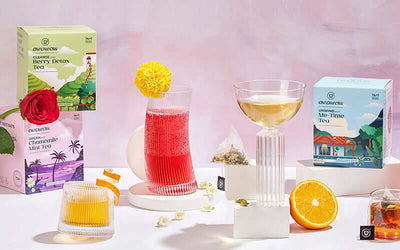Discover the potential side effects of drinking hibiscus tea with this comprehensive guide. Explore the potential risks and precautions associated with this popular herbal infusion.
What Are the Side Effects of Drinking Hibiscus Tea? A Comprehensive Guide
Hibiscus tea is a popular herbal infusion known for its vibrant colour, tangy flavour, and potential health benefits. However, like any other beverage or food, hibiscus tea may have side effects that need to be considered. In this comprehensive guide, we will explore the potential side effects of drinking hibiscus tea, as well as its benefits and overall effects on the kidneys. Understanding these aspects will help you make an informed decision about incorporating hibiscus tea into your daily routine.
The Potential Effects of Hibiscus Tea on Kidneys
One of the concerns often associated with hibiscus tea is its impact on kidney health. Let's delve into this topic and explore the potential effects.
1. Blood Pressure and Kidneys
Hibiscus tea is known for its ability to lower blood pressure due to its diuretic properties. While this can be beneficial for individuals with high blood pressure, it is important to consume hibiscus tea in moderation and monitor its effects. Excessive diuretic effects can potentially strain the kidneys, especially in individuals with existing kidney conditions. It is advisable to consult with a healthcare professional, especially if you have a history of kidney problems.
2. Oxalate Content and Kidney Stones
Hibiscus tea contains oxalates, compounds that can contribute to the formation of kidney stones in some individuals. If you are prone to kidney stones or have been advised to limit your oxalate intake, it is recommended to consume hibiscus tea in moderation or seek guidance from a healthcare professional.
Benefits and Side Effects of Hibiscus Tea
Apart from its potential effects on kidneys, hibiscus tea offers various health benefits, as well as some side effects that need to be considered.
1. Benefits of Hibiscus Tea
Hibiscus tea is rich in antioxidants and vitamins, such as vitamin C, that can boost the immune system, support heart health, and promote overall well-being. It is also known for its potential to lower blood pressure, reduce inflammation, and aid in weight management. These benefits make hibiscus tea an enticing choice for many individuals seeking a natural and flavorful beverage.
2. Side Effects and Precautions
While hibiscus tea offers numerous benefits, it is essential to be aware of its potential side effects and take appropriate precautions.
Low Blood Pressure: Due to its blood pressure-lowering effects, hibiscus tea may cause a drop in blood pressure, which can be problematic for individuals with already low blood pressure. If you have hypotension or are taking medications that lower blood pressure, it is advisable to consult with a healthcare professional before consuming hibiscus tea.
Pregnancy and Fertility: Hibiscus tea is generally not recommended during pregnancy as it may affect hormone levels and potentially interfere with fetal development. It is best to avoid hibiscus tea or consult with a healthcare professional if you are pregnant, breastfeeding, or trying to conceive.
Allergic Reactions: Some individuals may be allergic to hibiscus tea. If you experience any allergic symptoms such as hives, itching, or difficulty breathing,
Conclusion
While hibiscus tea offers numerous potential health benefits, it's important to be aware of the possible side effects associated with its consumption. Pay attention to your body's reactions, especially if you have kidney issues or other underlying health conditions. Moderation and consultation with a healthcare professional are key when incorporating hibiscus tea into your routine. By understanding the potential side effects and taking appropriate precautions, you can enjoy the flavours and benefits of hibiscus tea while safeguarding your health and well-being.














